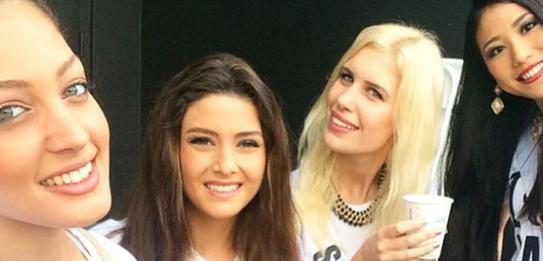It is claimed that the average women between 16 – 25 years old will spend more then Five hours a week taking photos of themselves (Bates, 2016). Not only females, but in all genders have been known to take place within this phenomenon of the Selfie. It wasn’t until 2013 that the term Selfie was added to the English dictionary (BBC, 2013), so what exactly is the Selfie?
The English dictionary states that the selifie is “a photograph that one has taken of oneself, typically taken with a smartphone or webcam, and is shared via social media”(Dictionary of oxford Dictionaries, 2017). Many critics view the Selfie as narcissism, stating that the photo taker is no longer taking in the moment in which they stand, but instead witnessing the moment through an iPhone lens (Gopnik, 2015). But is this really true or can the Selfie become empowering for woman? Or is there a massive risk in showing your face? .
According to John Berger (cited by Kulkarni, 2016) the idea of taking ones photograph relates to the way of seeing, stating that the Selfie is related to the concept of the male gaze, a term generated from Laura Mulvey. However what he does imply is that the new ideas of the female Selfie, the taker gazes upon her own body, claiming “ it is her look, her image, and ultimately, it is her gaze that the Selfie embodies”(Kulkarni, 2016). She is the image and the photographer. In a way the Selfie allows the taker to control how they want to be seen, compared to someone taking the photo from a camera, which they have no control over, thus unlocking the potential of her own power.

(photo source:Molly Coulthard tweeted her #uglygirlsclub selfie)
Women are more likely to find Selfies empowering, when they post pictures of themselves that do not adhere to any socially acceptable idea of a normal selfie photo. Which in return sees the image gaining and receiving support. For example, The Royal Holloway University Feminist Society decided to encourage young women to upload unflattering Selfies of them-selves online, using the hashtag Ugly Girl Club. With the aim to encourage the public to not judge women and people on there looks. These campaigns based on the selfie is not only getting women evolved but also men, creating a sense of equal-ness.
The president of the Society Natasha Barrett, stated “The aim of the campaign is to empower people to not just think of their worth in physical terms. The selfies were tongue-in-cheek to start with – but they carry a serious message, too, the selfie is a powerful message. People are getting to control their own image and present it to the world.”(Cited by Biddlecombe, 2014). Through this example it’s clear to understand that Selfies have the power to create awareness and create change. This was also demonstrated through the success of the no make up selfie campaign, which ended up raising over 8 million for cancer research in the UK (Biddlecombe, 2014).

(Photo source: Doron Matalon/Instagaram)
Though this does not imply that every selfie we take can have a powerful affect upon someone. Selfies can become quite problematic such as the Israeli beauty queen Selfie. The Israeli beauty queen caused such chaos with Lebanon, calling for her to lose her Miss Universe title, all because she was seen consorting with their country enemy. The photo seen above , referenced Miss Israel, Doron Matlon and Miss Lebanon, Saly Greige who are seen posing for a picture together at a pageant in Miami 2015. These two countries are technically at war with each other ( euters, 2015). The Lebanese community where outraged demanding for Greige to lose her title for talking to the enemy of the state, in need to defend herself she stated that Matalon had pestered her and finally ended up photo-bombing her photo (Euters, 2015). From this example its clear that the idea of the selfie could have good intentions but there are certain circumstances that come with it. The law can influence the way in which you decide to show your face, which can lead to a bigger situation then you thought, a bigger risk to you and maybe your lifestyle.
Though the selfie can be positive, it is clear that the effects of the selfie can’t change the reality of the world. Yes it can empower you; it might bring you knowledge that you didn’t know before, through the use of campaigns and awareness. But in harsh reality a photo can cause more damage then good depending on the situation. I guess it is up to you to decide if there is a risk to it? I would love to hear your thoughts? Do you think a selfie worth the risk? Let me know below?
As always all the best!
Chelsea x
References:
- Bates, L 2016, ‘Are selfies empowering for women?,’ The Guardian, 5th February , viewed 13th March, <https://www.theguardian.com/lifeandstyle/2016/feb/04/are-selfies-empowering-for-women>.
- Biddlecombe, S 2014, ‘We’re the ugly girls club. Meet the students sticking it (and tongues out) to their critics,’ Telegraph, 3rd December, viewed 13th March, <http://www.telegraph.co.uk/women/womens-life/11267399/Student-feminists-at-Royal-Holloway-University-Were-the-Ugly-Girls-Club.htmll>.
- Gopnik, A 2015, ‘Finding the Self in a Selfie,’ The New Yorker, 29 October, viewed 13th March, <http://www.newyorker.com/culture/photo-booth/finding-the-self-in-a-selfie>.
- Reuters, 2015, ‘Miss Israel’s selfie with Miss Lebanon sparks internal uproar,’ Nation Fox News, 19th January, viewed 13th March, <http://nation.foxnews.com/2015/01/19/miss-israels-selfie-miss-lebanon-sparks-international-uproar>.
- Reuters, 2015, ‘Israeli beauty queen selfie with miss Lebanon during Miss Universe contest causes stir,’ Telegraph, 18th January, viewed 13th March, <http://www.telegraph.co.uk/news/worldnews/middleeast/lebanon/11353580/Israeli-beauty-queens-selfie-with-Miss-Lebanon-during-Miss-Universe-contest-causes-stir.html>.
- ‘Selfie’ 2017, in Dictionary English Oxford Dictionaries, oxford university press, viewed 13th March 2017, <https://en.oxforddictionaries.com/definition/selfie>.
- 2013, ‘Selfie names by Oxford Dictionary as word of 2013,’ BBC news, 19th November, viewed 13th March, <http://www.bbc.com/news/uk-24992393>.
One thought on “LETS PUT THE SELF IN SELFIE !”